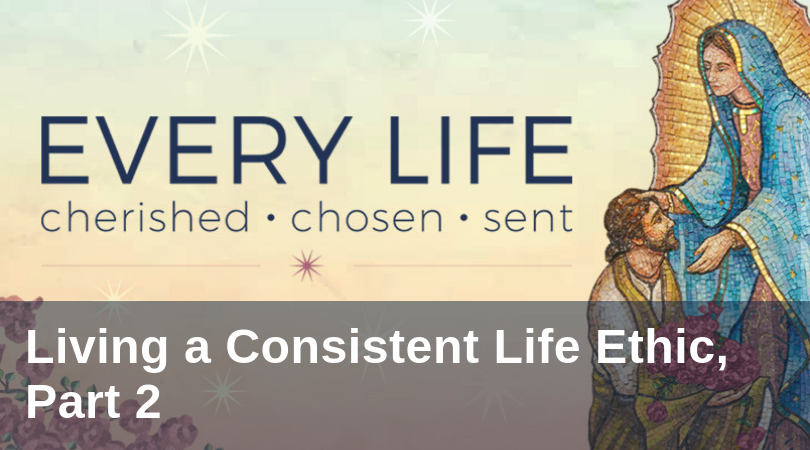
An essential part of living a consistent ethic of life is the need to re-humanize the everyday. One might be think, “Re-humanize the everyday?! What we need is the legal protection of the unborn, gun control, the abolition of the death penalty, and sensible, humane immigration legislation!” And one would be exactly right. Our nation desperately needs these sweeping legal changes. Along with this, perhaps even more than this, we need people who live a consistent ethic of life in the way St. Thérèse of Lisieux described and embodied in her short life: “I can prove my love only by scattering flowers, that is to say, by never letting slip a single little sacrifice, a single glance, a single word; by making profit of the very smallest actions, by doing them for love” (The Story of a Soul, Tan Books, 1997, p. 202). This requires a different kind of discipline—the kind of discipline Benedict XVI describes in Deus Caritas Est where he observes that even the most just society still remains in need of loving, personal (i.e., humanizing) concern (DCE, §28). Servant of God Dorothy Day called this kind of discipline a revolution of the heart, and said it is the greatest challenge of our day. Thus, in what follows you will not find policy recommendations or a summons to protest, but ideas for re-humanizing the everyday.
1. Waste time. Seriously.
Learning to waste time opens us to new possibilities (I’m not talking about scrolling social media!). Granted, people already have too many things on their to-do-lists; even spending time with friends can become an item to check off. I would suggest that if we don’t learn to slow down and waste time, we only reinforce a culture of efficiency, where people are reduced to their social function and utility. Slowing down allows us to live more gently, to be attentive to fragility and dependency. Jean Vanier, the founder of L’Arche, an international network of communities where people with and without disabilities share life together, stressed the need to slow down, to learn to “fool around and celebrate life” (Living Gently, 37). He names three ways that L’Arche communities slow down: (1) eating together, (2) praying together, and (3) celebrating. These are simple practices, but they are also revolutionary because they take us out of the world of efficiency and competition. These are forms of daily life that acknowledge our dependency and fragility, and also recognize each person as unrepeatable gift.
2. Listen. Really listen.
If we never slow down, we will never really listen to others. Learning to listen well is hard, especially in today’s politicized and polarized climate. Not only do we usually assume we know what a person is going to say before she says it, we also assume that we are right, and conversation then becomes an exercise in crushing our opponent rather than pursuing truth. But before we even think about listening to people with whom we disagree, we might first ask ourselves: When is the last time I really listened to my spouse? My child? My friend? The homeless man I pass on the street? What would it look like to listen well?
I’ll suggest just one possible response. First, learning to listen well requires presence and attentiveness, which is not equivalent to hearing the other person. We do all sorts of things with our bodies that indicate deep listening. Looking people in the eyes, turning our body toward them, and arranging our posture of reception. Listening well is thus not only an auditory exercise but also a physical encounter that acknowledges the humanity of the other. In other words, learning to listening means learning to empathize, to enter into the experience of another, their vulnerability, and their joys and sorrows.
These practices of re-humanizing the everyday—wasting time and listening—may seem insignificant, but they are part of what Stanley Hauerwas has called a “politics of gentleness” which makes not only makes room for the vulnerable, but welcomes fragility as a gift.
Editorial Note: This is the second post in a four-part series offering practical approaches to living a consistent life ethic. Subscribe below so you don't miss out on the rest of this series!




